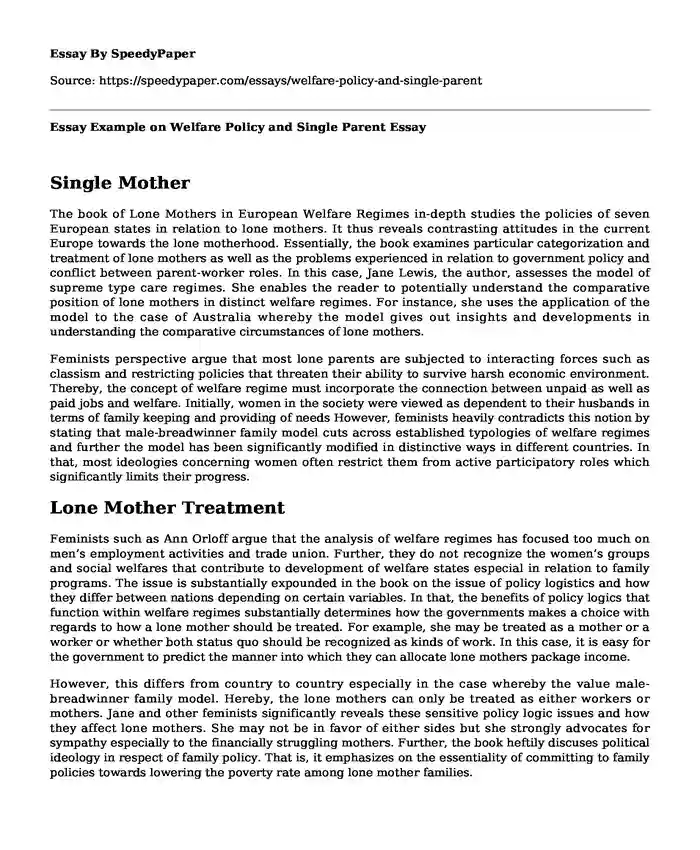
| Type of paper: | Essay |
| Categories: | Maternity Parenting Society Policy analysis |
| Pages: | 3 |
| Wordcount: | 650 words |
Single Mother
The book of Lone Mothers in European Welfare Regimes in-depth studies the policies of seven European states in relation to lone mothers. It thus reveals contrasting attitudes in the current Europe towards the lone motherhood. Essentially, the book examines particular categorization and treatment of lone mothers as well as the problems experienced in relation to government policy and conflict between parent-worker roles. In this case, Jane Lewis, the author, assesses the model of supreme type care regimes. She enables the reader to potentially understand the comparative position of lone mothers in distinct welfare regimes. For instance, she uses the application of the model to the case of Australia whereby the model gives out insights and developments in understanding the comparative circumstances of lone mothers.
Feminists perspective argue that most lone parents are subjected to interacting forces such as classism and restricting policies that threaten their ability to survive harsh economic environment. Thereby, the concept of welfare regime must incorporate the connection between unpaid as well as paid jobs and welfare. Initially, women in the society were viewed as dependent to their husbands in terms of family keeping and providing of needs However, feminists heavily contradicts this notion by stating that male-breadwinner family model cuts across established typologies of welfare regimes and further the model has been significantly modified in distinctive ways in different countries. In that, most ideologies concerning women often restrict them from active participatory roles which significantly limits their progress.
Lone Mother Treatment
Feminists such as Ann Orloff argue that the analysis of welfare regimes has focused too much on men’s employment activities and trade union. Further, they do not recognize the women’s groups and social welfares that contribute to development of welfare states especial in relation to family programs. The issue is substantially expounded in the book on the issue of policy logistics and how they differ between nations depending on certain variables. In that, the benefits of policy logics that function within welfare regimes substantially determines how the governments makes a choice with regards to how a lone mother should be treated. For example, she may be treated as a mother or a worker or whether both status quo should be recognized as kinds of work. In this case, it is easy for the government to predict the manner into which they can allocate lone mothers package income.
However, this differs from country to country especially in the case whereby the value male-breadwinner family model. Hereby, the lone mothers can only be treated as either workers or mothers. Jane and other feminists significantly reveals these sensitive policy logic issues and how they affect lone mothers. She may not be in favor of either sides but she strongly advocates for sympathy especially to the financially struggling mothers. Further, the book heftily discuses political ideology in respect of family policy. That is, it emphasizes on the essentiality of committing to family policies towards lowering the poverty rate among lone mother families.
Lone parenting
In historic times, the European countries were considered to be at the forefront in striving for equal treatment of kids in both two-parent and one-parent families. Additionally, studies indicate that due to lack of investment in children in Britain is crucial to explaining the high upcoming cases of teenage motherhood. Moreover, feminist scholars debate that the power resource theory requires to be refined to incorporate the role of lone parenting. Significantly, the countries discussed, vitally labels lone mothers as a severe social problem due to high unemployment rates.
Therefore, the author outlines the emergence of policies that advocate for all kinds of recognition that are allocated to care work such as; care allowances, child benefits, child care and parent leave. In respect to awarding of these recognitions, they should differ by the level and condition of entitlement and reflecting differing policy logistics around male-breadwinning family model.
Cite this page
Essay Example on Welfare Policy and Single Parent. (2017, Sep 26). Retrieved from https://speedypaper.com/essays/welfare-policy-and-single-parent
Request Removal
If you are the original author of this essay and no longer wish to have it published on the SpeedyPaper website, please click below to request its removal:
- Freud's Views on the Topic of Humor, Essay Sample
- Application Letter Sample for Master's Program in Clinical Mental Health Counseling
- Free Essay: Comparison of the Jasmines and Flower of Love Sonnets by Claude McKay
- Essay Example on Canopy Walkways
- Essay Example: Trump and Hillary Debate
- Impact of Musical Interventions on Language and Cognitive Development
- Essay Example about Pain Management: Osteoarthritis
Popular categories




